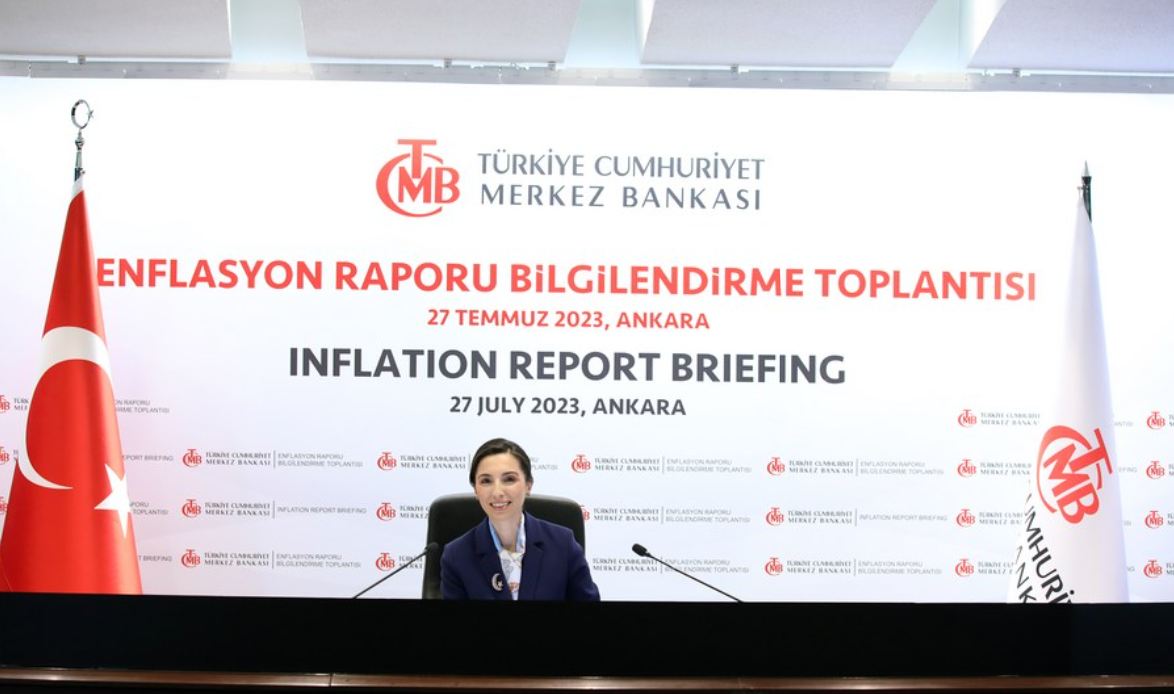Erkan, the first female governor of the bank, said inflation will rise “in the short term” and the impact of the inflation-curbing measures will not be shown until the second quarter of 2024. In presenting the key inflation outlook report of Central Bank (CBRT) managed to get rid of former governor Sahap Kavcioglu’ s wishful thinking approach to inflation, instructing the Report to focus on the real problem. However, a tight monetary policy which is the best medicine for soaring inflation, rate hikes, were conspicuously absent from the Report. Instead, growth will remain the priority, while demand-pull inflation will be fought with quantitative tightening measures and new macroprudential rules.
Turkey’s central bank expects inflation to hit 58% by the end of 2023, its new governor Hafize Gaye Erkan said in her debut news conference Thursday, as she committed to “restore anchoring of expectations as well as predictability.”
The new forecast is more than double the 22.3% outlined in the central bank’s last inflation report three months ago.
The central bank also revised its forecast for the end of 2024 to 33%, and its forecast for the end of the following year to 15%.
“Through decisions on quantitative tightening, we will ensure a stable development in the Turkish lira liquidity without generating excessiveness in exchange rates and domestic demand,” Erkan said.
“We will dynamically optimize the monetary tightening process by continuously measuring the effects of our decisions on inflation, markets, monetary and financial conditions.”
“We also sterilize liquidity through quantitative tightening, thereby enhancing the effect of rate hikes… We are making the gradual and steady rate hikes more holistic and stronger through quantitative tightening and selective credit tightening,” Erkan said.
Economists welcomed the massive upward revision, saying it shows that the new economic management team that took office after Recep Tayyip Erdogan’s re-election in May has adopted a realistic approach to inflation, distancing itself from optimistic projections.
“Increasing the year-end inflation forecast from 22 to 58 percent is a realistic and convincing step. This is positive in terms of credibility” for the Turkish economy, Selva Demiralp, professor of economics at Koc University in Istanbul, said on Twitter. She added that her year-end inflation estimate is 72 percent.
The current annual inflation rate announced on July 3 by the Statistical Institute is 38.2 percent, down from a 24-year peak of 85.5 percent in October 2022, although private estimates are much higher.
Erdogan named former economy chief Mehmet Simsek as his new treasury and finance minister, who was known for his market-friendly policies, and Erkan atop the central bank in early June.
The new team vowed a return to “rational,” conventional economic policies following two years of unorthodox moves such as lowering interest rates to tame high inflation which led to the decline of the national currency and a cost-of-living crisis.
The new management delivered two consecutive rate hikes in June and July and is expected to continue on this path.
“Until there’s a significant improvement in the inflation outlook, we will gradually strengthen monetary tightening as necessary,” Erkan said on Thursday.
“It is important that the central bank continues its tightening monetary policy in order to eliminate inflationist concerns and keep inflation under control,” Enver Erkan, chief economist at Istanbul’s Dinamik Investment Securities, told Xinhua.
This analyst said that the central bank “is aware of the importance of taking measures to combat inflation and stabilize the economy”.
Faced with a budget deficit caused by increased spending ahead of the May elections and on rebuilding work after the earthquakes in southern Türkiye, the government raised the value-added tax on various household goods earlier this month.
The continued weakening of the lira and tax hikes are likely to fuel inflation in the second half of the year, in line with the central bank’s new projections, according to analysts.
“Many economists already expect inflation to be around 60 percent by the end of the year,” Enver Erkan noted.
Is Portfoy executive vice president Nilufer Sezgin said the central bank’s forecasts were in line with market expectations, unlike in previous years when there were “serious differences”.
“The central bank did not only provide an inflation forecast that is in line with economists’ predictions but… the emphasis in the report very much matched those of the market. We had not seen this from the central bank in many years. This is an important and positive change,” she said.
Follow our English language YouTube videos @ REAL TURKEY: https://www.youtube.com/channel/UCKpFJB4GFiNkhmpVZQ_d9Rg
And content at Twitter: @AtillaEng
